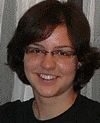 Agnes Cseh,
Agnes Cseh,
BMS Phase I student,
BSc Budapest University of Technology and Economics
From the point of view of this applicant, the BMS Days in February 2010 opened the gates to a new way of doing Mathematics. The professional lectures gave an overview of the current research topics running in Berlin while the presentations over the organizational part of the studies sketched the advantages of being part of the BMS. Moreover, numerous current BMS students participated in the event to help us by sharing their personal experiences. At the end of the BMS Days I was sure that I wanted to return to Berlin in September to start my studies here. The BMS Admissions Committee fortunately decided to enable me to take this step.
Having arrived in Berlin, I participated in an intensive German language course which helped me a lot in my everyday life in Germany. After the first couple of weeks spent here I can tell that living in Berlin is pretty fun. However, we were well-trained for the difficulties we would possibly face. Besides the language course, an Orientation Week was organized for us before the semester began. The event started with a sight-seeing tour, continued with an intercultural seminar and ended with a study-oriented presentation. During this week we got to know that all the Prussian emperors were called Friedrich and/or Wilhelm, that Germans are coconuts in a sense and on the last day we were informed about requirements and opportunities at the BMS. I felt myself warmly welcomed in Berlin. With this feeling I began my first semester as a BMS student.
published in November 2010
Update 2015: Agnes finished her masters thesis in July 2012 and was in Phase II since then. She did research as a PhD student in the group of Martin Skutella at TU Berlin. She spent over a year as a visiting researcher at various institutions in India, the UK, the USA and Germany (Bonn). Agnes defended her doctoral thesis in December 2015.
Update 2018: After a research stay at the ICE-TCS (Icelandic Centre of Excellence in Theoretical Computer Science) in Reykjavík in 2016, she has started a post-doc at the Hungarian Academy of Sciences in Budapest. Her main research focus is the algorithmic study of matching problems under preferences.





















